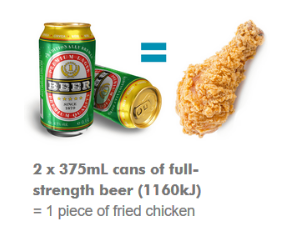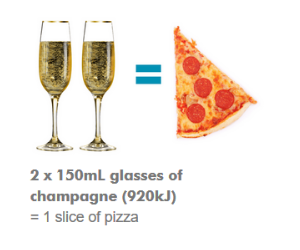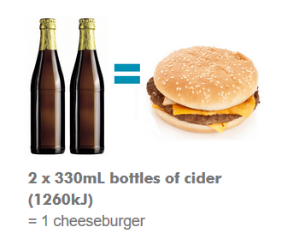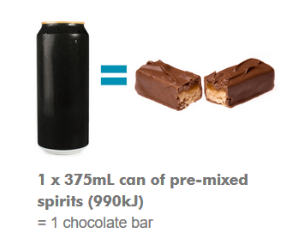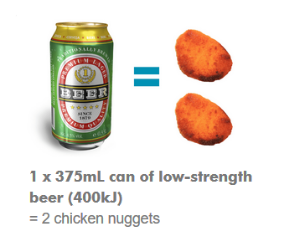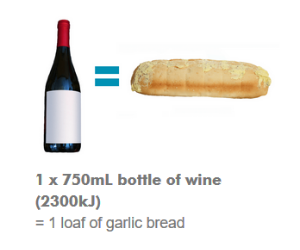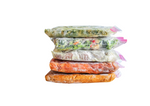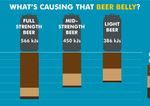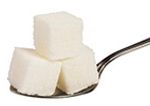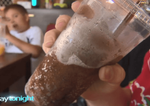The surprising amount of kilojoules in alcohol
by Abbie-Clare Vidler, LiveLighter Project Officer
- June 1, 2020
- Leave a comment
With many of us feeling more stressed than usual as we navigate through this once-in-a-lifetime pandemic, it can be tempting to turn to alcohol to help us cope. It can seem like an easy relaxation technique when so many of our other outlets are closed.
The problem is that alcohol can take a toll on our mood, sleep and energy levels, leaving us feeling more stressed and run down! Alcohol is also damaging for our long-term health, increasing the risk of stroke, high blood pressure, heart disease, liver disease and certain cancers.
Many people are also surprised to find out that alcohol, in all its forms, is packed with kilojoules (kJ, also known as calories). Over time, the kilojoules in the alcohol we drink can really start to stack up, which can lead to weight gain. Check out the comparisons below!
On average, Australians spend an astonishing $1700 each year on alcohol. For that amount of money you could pay for a year’s worth of yoga classes, or return flights to Barcelona once airports open up again!
Should I choose a low-carb option to reduce my kilojoule intake?
It’s easy to be tricked into thinking that some alcoholic drinks are healthier than others. This is because alcohol companies use healthy sounding words on their label and in their advertising like ‘low carb’, ‘organic’, ‘natural’ or ‘preservative free’. But what this nice packaging doesn’t tell you is that the kilojoules in alcoholic drinks mainly come from the alcohol itself rather than any sugar and carbohydrates included. This means that if you do drink, lower-alcohol options are a better choice, although keep in mind they still have extra kilojoules your body doesn’t need. Any amount of alcohol also increases your risk of developing cancer. The more you drink and the more often you drink, the greater your risk.
Can I “make up” for my alcoholic drinks?
Reducing the amount you eat or exercising more in an effort to balance out the extra kilojoules you take in from alcohol is dangerous. This can put your mental and physical health at risk. LiveLighter recommends cutting down on the amount of alcohol you drink to reduce your kilojoule intake rather than trying to offset the kilojoule load in other ways.
How many kilojoules are in my drink?
It adds up quickly! A few drinks can be the equivalent of a small meal.
| DRINK | SIZE | KILOJOULES* |
|---|---|---|
| Full-strength beer (5% alcohol) | 375mL can | 580 |
| Full-strength beer (5% alcohol) | 570mL pint | 880 |
| Lower-alcohol beer (2.1% alcohol) | 375mL can | 400 |
| Lower-alcohol beer (2.1% alcohol) | 570mL pint | 610 |
| Wine/ champagne | 150mL glass | 460 |
| Cider | 330mL bottle | 630 |
| Cider | 570mL pint | 1090 |
| Pre-mixed spirits | 375mL can | 990 |
| Espresso martini | 30mL coffee liqueur 30mL vodka 30mL coffee shot |
710 |
*The kilojoule content will vary between brands therefore the figures in this table are an estimate only.
*Adults need about 8,700kJ per day, preferably form healthy foods and drinks!
How can I reduce my alcohol intake?
- Organise social catch-ups that don’t centre on alcohol. Go for a (physically distanced) walk with a friend, have a chat on Zoom or meet for a take-away coffee.
- Have alcohol-free days.
- Switch your usual drink for an alcohol-free alternative like zero-alcohol beer or wine. Check the label as the kilojoule content can vary widely between products. Aim for less than 60kJ per 100mL for non-alcoholic beers and less than 100kJ per 100mL for non-alcoholic wines.
- If you do drink, set yourself a maximum number for the night and if you are buying drinks to take home only purchase the amount you plan to drink. We all know how hard it is to stick to a limit when you have easy access to more!
- Swap regular alcoholic drinks for low-alcohol alternatives like mid-strength beer or low-alcohol sparkling wine. You could also try stretching mixed drinks with sparkling water (hello white wine spritzer!)
- Try alcohol-free drinks made with fizzy water, fresh herbs and slices of fruit, or experiment with some of our refreshing non-alcoholic drinks.
- For more great tips to reduce your drinking check out the Alcohol. Think Again website.
